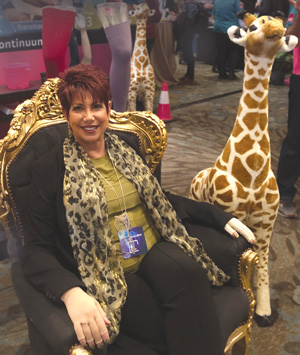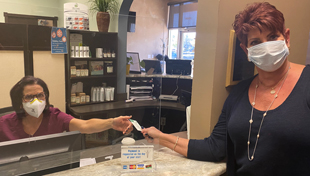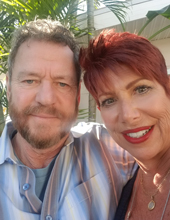Armed with a self-described “big mouth,” a love of medicine and a desire to wear a suit and carry a briefcase, Willa Moats, CPMR, made the jump from operating room nurse to independent manufacturers’ representative 35 years ago. Today she heads Willcare Associates, LLC, Milford, Pennsylvania. The agency serves the greater New York area, northern New Jersey, and upstate New York.
Given her extensive medical background, the obvious questions for Moats are how and why she embarked on such a dramatic career change. She explains, “In the mid-1980s, as a single mother, I wasn’t making a great deal of money working in the emergency room. As my frustration grew, one day I read a newspaper classified ad for a sales job. The ad stated: ‘Medical knowledge a plus; earning potential unlimited.’” She interviewed for the job, and took on her first two lines as an independent manufacturers’ rep. “That was my start.”
“Admittedly I didn’t know how to be a rep. Moving forward I experienced success and failure via trial and error. One thing I was always good at, however, was networking with people. I contacted peers who did the same thing I was doing and learned from them.”
The Manufacturer Side
Moats’ initial foray into the world of reps was interrupted by a six-year period (1995-2001) as the national sales manager for a manufacturer. She credits that time of her career as allowing her to broaden her knowledge contact base. Following her resignation from the manufacturer in 2001, she reopened her rep agency. Looking back at that decision, she notes, “My time with the manufacturer let me know what manufacturing was like from the inside out. At the same time, I learned how independent reps could be successful or not. I also realized I was a better rep than a manager.”
Perhaps it’s her time on the manufacturer’s side of the desk that causes Moats to observe that “I’m not sure all manufacturers appreciate everything that their reps can provide them. Too many of them just look at numbers and think that’s all that counts. To combat that I attempt to treat each manufacturer I represent as if I’m one of their direct salespeople.”
Her time as a manufacturer also provided her with a perspective of what manufacturers should expect out of the relationships they create for each other. For instance, “If there’s anything a manufacturer looks for from their reps, it’s responsiveness. The rep has to keep in mind if they are repping a ‘B’ or ‘C’ line, they have to make every effort to let the manufacturer know that they’re just not out there wasting time. If you as a rep accept a line, you owe a percentage of your time to that manufacturer — and you let the manufacturer know what you’re doing for them. That’s why backselling is so important. Keep your manufacturers informed on what you’re doing on their behalf.”
If that’s an important factor she learned from the manufacturer’s perspective, she’s got another perspective as a rep. “As I explained, I try very hard to treat each manufacturer as if I’m their direct salesperson. However, they need to appreciate the fact that the rep can only devote a portion of their time to their line. I would say many don’t recognize the fact we’ve got to keep an eye on our return on investment and have other lines we work with.”
Finding Lines
Asked how she finds lines to represent, Moats says that word of mouth is the most common process. “Basically, some manufacturers find me by way of our reputation.” Then there’s the subject of taking on lines that don’t necessarily have business in her territory. “When it comes to missionary work, we’ve had several manufacturers ask us to take on their lines. In general, I won’t do it.”
When she does take on a line, however, she’s insistent that “there has to be an understanding that there’s going to be a benefit to both the manufacturer and the rep. We’re looking to establish long-term relations with the manufacturer based on my ability to produce and their ability to provide the support needed to sustain the relationship.”
During her time away from the agency, Moats explains that things had changed quite a bit. “The world I was used to went from homecare products to a radiology world.” Today the agency represents manufacturers of radiology, medical/surgical rehabilitation and homecare products.
Staying on the subject of change, she goes on to describe something else that’s changed in her life as a rep: “If anything, technology has really changed the way we all conduct business. It has gradually crept into our lives. I can recall the time of beepers, faxes, and taped answering machines. Cell phones, emails, texting, and the internet have had positive and negative effects. Positively, we can do more in a day, faster and more efficiently than ever before. Negatively, however, you are never done. If you allow it, you can be ‘on’ 24 hours a day. For someone like me, who is all over everything as quickly as I can be, I had to train myself to put the phone down and turn the computer off. This is the only way I can turn off my brain and rejuvenate for a time.”
Tech’s Impact
“The good news is that technology also allows us to have more customers and more products to sell to them efficiently, all with the manufacturers’ focus. Our customers also have more expectations. So yes, technology has changed us, especially for us old timers who have seen it come to fruition.
“I will leave the subject with one observation I recently noticed. What’s old is new again. Many companies have gone back to snail mail in hopes of being noticed. People have gone back to actual phone calls in order to avoid issues and conduct quick conversations. Emails and texting can cause problems that aren’t really there. They can also delay the result with back-and-forth chains. At times, I believe it is easier and faster to pick up the phone. I even see some younger folks doing this.
Willcare Associates is owned by her and her husband Roger. “At one point, Roger worked out in the field but now he does everything internally and I’m in the field.” She adds, “I don’t really like to manage people, so right now, I’d say I don’t want to get any bigger and we’re probably the right size.”
Moats is quick to credit some decisions she’s made that have allowed her and her agency to get to the comfort level she presently occupies. Specifically, she notes her membership in MANA, participation in the Health Industry Representatives Association (HIRA), and her decision to earn CPMR certification as major steps in her growth. Speaking of the latter, she says, “From the very beginning, I was comfortable with the medical industry. However, during my experience in CPMR, I was pleasantly surprised with what I was able to learn from others. I recall entering the CPMR program with an attitude that it wasn’t going to do me any good. I was humbled in about five minutes. What I learned about being a rep was incredible. No matter who I spoke with, I learned we all have the same problems with manufacturers, consolidation, mergers, etc. At the end of the day the important thing I learned is that it’s not so much what you know, but who you know.”
Association Involvement
Complementing her experience with CPMR, Moats points to her membership and participation in MANA and HIRA as valuable. “No matter how old I am or how much experience I have, I’ve learned how valuable it is to network with peers. That’s why I joined HIRA. My peers are not only my competitors but also my colleagues. Speaking with them and sharing information has a positive effect on all of us.” Backing up those words with action, Moats has served as president and is now past president of the association.
She explains that it was through her involvement with HIRA that she learned about MANA. “MANA is a much larger organization than HIRA and the information and services the association provides are tremendous.” Taking full advantage of what MANA has to offer, Moats is a member of the association’s “A League of Their Own” women’s rep group.
Given the continued impact of the COVID-19 pandemic on business and business practices, it’s impossible to exit any conversation with an independent manufacturers’ rep without asking how they’ve fared over the past year. So too with Moats as she explains, “While I consider myself lucky, I’d have to say that at the beginning the situation in the greater New York area was insane. Initially, I benefited in being able to provide needed medical supplies to efforts at Mt. Sinai Hospital and the Javits Center in New York City. Around May, that business dropped off, but I continued to do quite well from a selling standpoint due to the long-term relationships I’ve established with my distributor partners.”
With an eye to the future Moats adds, “I still miss nursing, but as I look to the future, I remain optimistic. My mother used to say how frustrated she used to get when she was still working hard into her 50s. I think I’ve got a second wind for what I do. Sure, there’s frustration when some national group comes in and wants to take over your territory, or you lose a line — but I don’t stay frustrated. I get angry and work harder. Then I find good things start happening for me.”
MANA welcomes your comments on this article. Write to us at [email protected].




